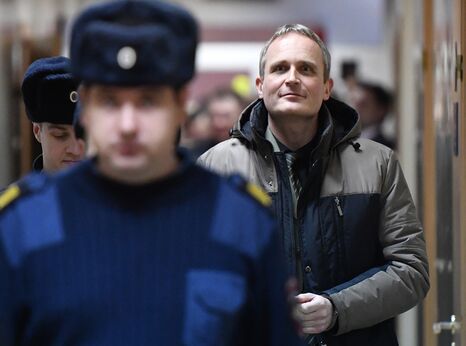Early release of Jehovah's Witness reverted

Jehovah’s Witnesses have faced persecution and harassment in modern Russia since 2009, when a court in Rostov Region in southern Russia banned the local Jehovah’s Witnesses’ (JW) organization and declared 34 of JW’s publications “extremist”. In subsequent years, several Jehovah’s Witnesses’ groups across Russia were pronounced “extremist” by local courts. The relevant decisions relied on the vague definition of “extremism” in Russian law and were consistent with the growing practice of its vague application which increasingly targeted political, but also religious and other forms of dissent. In April 2017, the Russian Supreme Court ruled that the central Jehovah’s Witnesses organization in Russia should be closed, its activities stopped, and its property confiscated. This effectively banned all local groups. Since then, any activity on behalf of a local Jehovah’s Witnesses group has been regarded as criminal.
Dennis Christensen – a Danish national who has been living in Russia for over 20 years – was arrested a month after the Supreme Court’s decision, becoming the first Jehovah’s Witness to be detained in Russia following the ban.
On 6 February 2019, the Zheleznodorznyi District Court in Orel found Dennis Christensen guilty of “organizing activities of an extremist organization” (Article 282.2 (1) of the Russian Criminal Code) and sentenced him to six years in prison. According to the prosecution, Dennis Christensen was organizing local worship by Jehovah’s Witnesses, and as evidence of his “crime” he was collecting donations and organizing cleaning of the venue used by the worshipers. On 23 May, the Orel Regional Court upheld the sentence and he was then transported to correctional penal colony No 3 in Kursk region, some 200 km away from his home in Orel.
There, Dennis Christensen has reportedly faced harassment of the penal colony administration, including via unsubstantiated reprimands for alleged regime violations. Although Dennis Christensen was still feeling the after effects of pneumonia, the penal colony administration was not giving him the needed medicines and have reportedly “lost” his medical file. In June 2017, Dennis filed a complaint with the European Court of Human Rights against his arrest. Subsequently, the Kingdom of Denmark joined Christensen v. Russia as the third party. His application has passed the communication stage.
Dennis Christensen’s multiple applications for parole or easing of the regime had been rejected, and only his fourth application reached the court. On 23 June 2020, the Lgov District Court ruled to commute Dennis Christensen’s sentence and release him subject to a RUB 400,000 (USD 5,304) fine. However, this decision was appealed by the prosecution. On 4 September, Kursk Regional Court quashed Lgov Court’s decision and sent the case back for a new consideration. Following this, Dennis Christensen has been subjected to further harassment by the penal colony administration and has spent 27 days in the punishment cell for purported disciplinary offences.
According to the data provided by the Jehovah’s Witnesses organization, since Dennis Christensen’s conviction, persecution of its members in Russia has intensified. As of 7 September, criminal proceedings have been opened against at least 384 Jehovah’s Witnesses under “extremism” charges. Ten people have been convicted. At least 36 people were remanded in custody, and a further 27 people were under house arrest. At least 1130 homes of Jehovah’s Witnesses have been raided since 2017 Supreme Court ruling.
Amnesty International regards the Russian authorities’ decision to criminalise JW’s teachings and practices an arbitrary and discriminatory measure, and a violation of the right to freedom of religion. The organization has called on the authorities to quash these decisions. It has also consistently stressed that anti-extremism legislation in Russia is often applied arbitrarily and has called on the authorities to review the relevant legislation and practice and bring them in line with international standards. Amnesty International considers Dennis Christensen and any Jehovah’s Witness deprived of their liberty solely in connection with the peaceful exercise of their right to freedom of religion to be prisoners of conscience. They must be immediately and unconditionally released, all convictions quashed and all pending charges against them dropped.